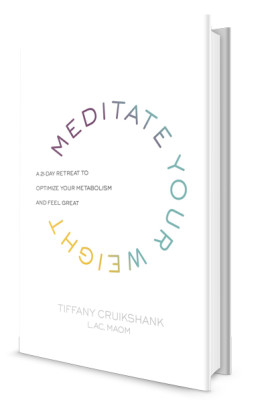We’ve been conditioned to believe that stress is the ultimate 21st century evil, but Tiffany Cruikshank wants you to know that’s not exactly true.
As the Yoga Medicine founder and meditation expert explains, our innate stress response is actually super useful; it’s what causes us to act fast when, say, we’re about to get hit by a bus. But when we perceive every little less-than-ideal event in our day as a potential threat—a full inbox, a traffic jam, a grumpy barista—we keep our minds stuck in the fight-or-flight danger zone.
 In other words, says Cruikshank, it’s our (totally controllable) response to stressful events that’s dangerous, rather than the stressful circumstances themselves. “I think a lot of it has to do with the pressure we put on ourselves in a world that’s moving at supersonic speeds,” she adds. “We feel the need to keep up—and when we don’t, we judge ourselves and create a lot of internal stress.”
In other words, says Cruikshank, it’s our (totally controllable) response to stressful events that’s dangerous, rather than the stressful circumstances themselves. “I think a lot of it has to do with the pressure we put on ourselves in a world that’s moving at supersonic speeds,” she adds. “We feel the need to keep up—and when we don’t, we judge ourselves and create a lot of internal stress.”
Luckily, we can choose differently—and in her new book, Meditate Your Weight, Cruikshank shows us how. Although the book technically centers around weight loss, its daily regimen of guided meditations and journaling prompts—including those geared towards self-esteem, overcoming perfectionism, and, yes, stress-proofing—are helpful for pretty much anyone who wants to adopt a healthier mindset.
So how does Cruikshank suggest we rewire our stress response so it only kicks in when it's really needed? “The most important thing is just to notice the process,” she says. “Begin to question whether this internal stress or tension is appropriate to the situation.” (In other words: No, you aren’t in mortal danger because your apartment is messy and your to-do list is long.) And with a mindful perspective, she says, comes peace.

{{post.sponsorText}}
Next time you’re feeling frazzled, take a time-out to complete Cruikshank’s five-minute stress-proofing meditation and journal exercises. Serenity now!
5-Minute Meditation
Today’s meditation is all about developing your ability to notice the sensations in each breath, but then also to see the bigger picture.
The first part is to observe the breath, acknowledge the sensations in the body, and see if you can detangle them from the mind.
Then, recount a stressful situation or a stressful day—anything recent enough that you can recall it in full detail and really connect to that memory.
Notice the sensations the recollection brings up in your body. Is it possible to just allow the sensations to exist and to disengage the mind—to just notice and watch them? Take a moment to do this.
Then, notice what it feels like to acknowledge that everything will pass at some point. Consider that in the big picture, a month or year from now, you’ll look back on this one little stressful experience and it will be insignificant.
Last, notice what it feels like to acknowledge that right now, in this moment, you have everything you need.
Journal Exercises
Today’s journaling will focus on stressful moments.
1. Notice your stress points, either from yesterday or last week, whether they’re minor incidents, ongoing situations, or big events.
2. Ask yourself, how different would those stress points look if you were able to take an observer’s mindset? To detach yourself in the moment when you feel stress and simply observe? Notice the experience and imagine the big picture.
3. Will the outcome of those moments look different? Sometimes it will, and sometimes it won’t. How will it be different? Remember, today’s work is not necessarily changing stress or outcomes but rather changing your perception. That shift alone has a profound effect on your health.
Meditation's not the only way to lower your stress levels—you could always try floating in a sensory deprivation tank, foam rolling, or forest bathing.
Excerpted from Meditate Your Weight: A 21-Day Retreat to Optimize Your Metabolism and Feel Great Copyright © 2016 by Tiffany Cruikshank. Published by Harmony Books, an imprint of Penguin Random House LLC.
Loading More Posts...